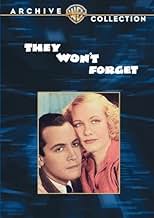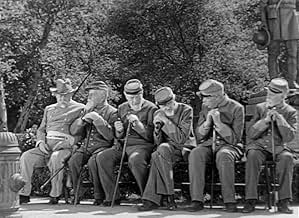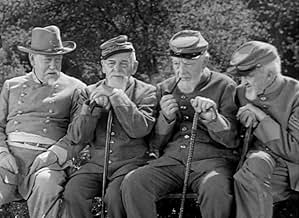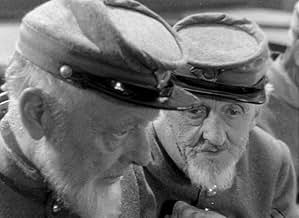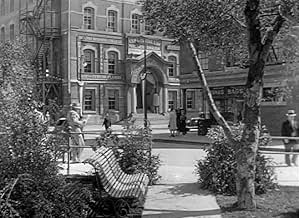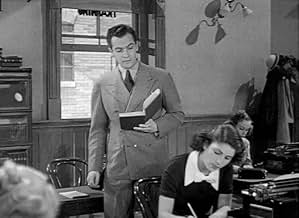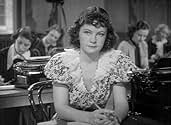Aggiungi una trama nella tua linguaA politically ambitious district attorney, unscrupulous tabloid journalists, and regional prejudice combine to charge a teacher with the murder of his student.A politically ambitious district attorney, unscrupulous tabloid journalists, and regional prejudice combine to charge a teacher with the murder of his student.A politically ambitious district attorney, unscrupulous tabloid journalists, and regional prejudice combine to charge a teacher with the murder of his student.
- Regia
- Sceneggiatura
- Star
- Premi
- 3 vittorie totali
- Mrs. Hale
- (as Elizabeth Risdon)
- Mrs. Clay
- (as Sybil Harris)
Recensioni in evidenza
Local newspaper staff bursts into Hale's apartment, tells Hale's wife that he's in jail, and after she faints, newsmen search the apartment, taking a honeymoon photo, searching through drawers.
This movie demonstrates how a quest for political power can taint a trial. Being an "outsider" can make it difficult for a fair trial. Although this takes place in the south, mob justice can and has occurred all over the country during the 1920's and 1930's.
**** (out of 4)
Terrific Warner drama about a school teacher (Edward Norris) from the North who's working in the South when one of his students his murdered. The local D.A. (Claude Rains), wanting to rise in the political game, charges the teacher with the murder not because of evidence but because the Southerners think he's guilty due to being from the North. I've been wanting to see this film for many years now after hearing so much about it and it certainly didn't let me down. I think the courtroom drama is probably my favorite genre and this here ranks with the very best out there. What really stands out are the performances, which are all excellent. Norris doesn't stand out in the crowd but he delivers a very somber performance. The real standout is Gloria Dickson as his wife. The final speech she gives is quite chilling and very memorable. Rains also gives a great performance, although I think he goes a bit over the top in a couple of the courtroom scenes. Lana Turner, in her screen debut, also comes off very memorable especially with her "giggle" as she walks down the street in that tight sweater. Mervyn LeRoy does a great job at building all the suspense and anger that surrounds the controversy of the case, which is based on a true story. After watching this film as well as Mississippi Burning this year it's rather amazing to know this stuff happened within the last one-hundred years.
There's also an uncommon richness of detail. The script, for all its sprawl, remains tight and unrelenting, a genuine testament to writers Rossen and Kandel. Then too, producer Le Roy pulled out all the stops and the results show it. No one acts without apparent reason. Everyone has understandable motivations for doing what they do. That's why the upshot is so tragic. It's as though there's an on-rushing train nobody can stop because the momentum is carried by an infernal logic greater than the demands of justice. Despite appearances, it's not an anti-lynching film, though it is that. Rather, it's a down and dirty look at the cynical roots of injustice. From lowly pool hall to lofty city council, no one wants to convict an innocent man, but then no one much cares either. This movie stands as a fine example of why Warner Bros. was the studio of record during the stressed-out 1930's. Anyway, for guys who don't like the gloomy theme, there's always the chance to catch Lana Turner as she juggles two balloons while sashaying up the sidewalk in the film's most famous scene.
All in all-- a classic of 30's social realism, with Hollywood at its unapologetic best.
Great role for Claude Rains, who owns every scene he's in as a remorseless politician out to further his career regardless of cost. Edward Norris (Ann Sheridan's first husband) has probably his biggest role as Robert Hale and does a fine job. Film debut of Allyn Joslyn, who plays a slimy reporter colluding with Rains. Pretty Gloria Dickson plays Hale's wife. She has a potent speech at the end. First significant role for Lana Turner. Note the tight sweater which accentuates her...attributes. This is why she was dubbed "the sweater girl" early in her career. The rest of the cast is made up of familiar faces, including Otto Kruger and Elisha Cook, Jr.
Loosely based on the real story of Leo Frank, a Jewish man accused of murdering 13 year-old Mary Phagan in Georgia. He was lynched in 1915. The story here keeps antisemitism out of it, instead making it more of a focus on the resentments and prejudices of the South towards the North. Having grown up in the South, I know these sentiments were very real for many even decades after this movie was made. This is a film that examines everything from bigotry to mob mentality and the manipulation of the public by politicians and the media. Sociologically and historically relevant, it's a powerful movie from Warner Bros. with a good cast.
Lo sapevi?
- QuizThe novel "Death in the Deep South" and this movie version were based on the notorious murder trial and subsequent lynching of Leo Frank. The film mentions the suspect's Northern background, which was a factor in his lynching, but does not mention that he was Jewish. The real-life victim, Mary Phagan, was only 13 years old, a far cry from Lana Turner's 16-year-old "sweater girl."
- BlooperDuring the entire trial the shadow of the window is showing in the same place; behind the witness chair/over the back door of the courtroom.
- Citazioni
Drugstore Clerk: What'll it all be be, ladies?
Imogene Mayfield: Dope and cherry, Fred.
Drugstore Clerk: [to Mary] How about you, half-pint?
Mary Clay: Make mine a chocolate malt and drop an egg in it as fresh as you are.
Drugstore Clerk: The hens don't lay 'em that good.
- ConnessioniFeatured in Hollywood and the Stars: The Angry Screen (1964)
- Colonne sonoreKingdom Coming
(1862) (uncredited)
aka "The Year of Jubilo"
Music by Henry Clay Work
Played during the opening credits
I più visti
- How long is They Won't Forget?Powered by Alexa
Dettagli
- Tempo di esecuzione1 ora 35 minuti
- Colore
- Mix di suoni
- Proporzioni
- 1.37 : 1
Contribuisci a questa pagina



